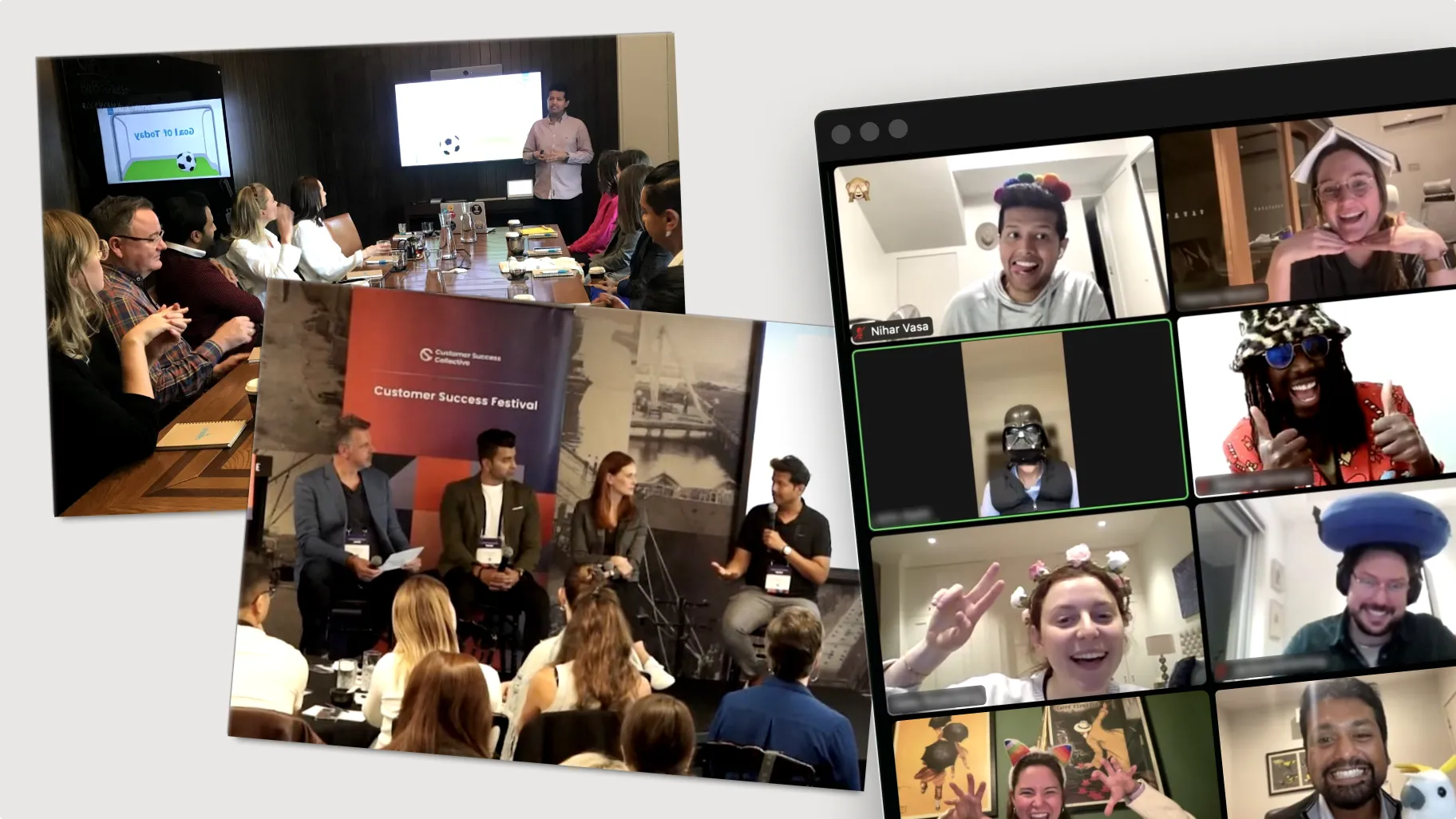From chaos to clarity
A Customer Success expert's guide to scaling customer intelligence
Insights from

NVaaS
Empowering impact startups to sustainably build, align, and scale

Nihar Vasa
Founder

About NVaaS
Integrations used
Twine call bot
Record and identify key moments from your calls
Slack
Reports and clips delivered where your teams already work
Impact
For impact startups racing to build sustainable businesses, the ability to truly understand and act on customer feedback can mean the difference between success and failure. Yet as these companies scale, maintaining a close connection to customer needs becomes increasingly complex. Nihar Vasa, a veteran Customer Success leader who has helped drive hypergrowth for startups in climate tech and AI automation, has seen this challenge play out across dozens of companies.
The expert’s perspective
With experience across multiple industries and a track record of coaching high-performing CS teams, Nihar brings a unique perspective to startup operations. His consultancy, NVaaS (Nihar Vasa as a Service), helps impact startups build sustainable systems that scale both their operations and their people.
“Our mission is to empower impact startups to sustainably build, align, and scale their systems and the humans that power them.”
Through his fractional Customer Success leadership service, Nihar helps startups build and optimize their CS strategy to drive key metrics from Time to Value through to Net Revenue Retention. But across his client base, he consistently encounters a critical challenge: the disconnect between customer feedback and product development.
The startup scaling challenge
The benefit of being a startup is being agile enough to experiment and pivot on your strategy based on customer insights. But if these insights aren’t coming through, or only coming through with recency bias and with a specific agenda driving them, how are teams meant to make customer insight-led decisions?”
Through his work with various startups, Nihar has identified three critical barriers that prevent companies from effectively capturing and acting on customer intelligence:
- Information silos: Valuable insights often remain trapped in team members’ heads and email inboxes, making it impossible for product teams to access critical customer feedback. When teams do make an effort to document their learnings, the information is often stored in separate records without a centralized view.
- Manual overhead: Despite implementing tools like CRMs and AI transcription services, product teams still have to manually sift through mountains of data to find relevant insights. As Nihar notes, “Good for documentation and training, but not for insights.” This creates a significant time burden that takes product teams away from actual development work.
- Insight quality: “The squeakiest wheel gets the oil,” says Nihar. Even when teams try to centralize feedback in channels like Slack, individual biases can skew which problems get attention. The challenge isn’t just collecting feedback—it’s ensuring that the feedback represents genuine patterns rather than isolated incidents.
The human cost of poor systems
The impact of these challenges extends beyond just missed insights. Customer Success Managers, particularly high performers, often invest significant time and effort into sharing feedback with product teams, only to feel like they’re shouting into the void.
“They’re left wondering: Where did it go? What actions did we take? Does it even matter? Now they’re not only chasing customers but also the product team.”
This breakdown in communication creates multiple problems:
- Demotivated teams: CSMs who invest time in providing detailed feedback but receive no updates become discouraged from sharing future insights.
- Incomplete picture: Without a systematic way to capture feedback, companies often miss crucial insights. Traditional solutions like well-kept notes have their place for agendas and next steps, but as Nihar puts it, “using them as a solution to gain customer insights? C’mon we need to move on from the 1900’s.”
- Business metric impact: This communication breakdown directly affects critical metrics like Net Revenue Retention, CSAT, and Customer Effort Score. When customer feedback doesn’t reach product teams effectively, companies risk building features that don’t address real user needs.
A new approach to customer intelligence
After evaluating numerous solutions across his client base, Nihar has found that AI tools need to focus on more than just efficiency.
“In an age where GTM teams are crowded with AI assistants, Twine is a breath of fresh air. It’s solving the core pain point by cutting out the middleman and providing contextual customer insights directly to the teams that need it.”
The impact has been particularly notable in several areas.
Direct customer voice
Instead of relying on filtered or summarized feedback, teams can share actual customer clips in their #insights Slack channels immediately after calls. This immediacy helps maintain the context and emotion of customer feedback, making it more actionable for product teams.
Balanced perspective
Weekly customer love digests help surface positive feedback, which often gets lost in the noise of problem-solving. As one dev team member shared, “Loved seeing all the customer love for our product at All Hands.” This helps maintain team morale while providing valuable insight into what’s working well.
Business context
Integration with tools like Hubspot allows teams to segment insights by customer persona and ARR, making it easier to prioritize feedback strategically. This has been so impactful that, as one Head of Partnerships noted, teams are asking “Can we have a digest for all our partners too?”
Continuous learning
The ability to go back and get updated insights on specific topics helps teams track how customer needs evolve over time. This is particularly valuable for startups, who need to stay agile and responsive to market changes.
The future of customer-led growth
For Nihar, this represents a crucial evolution in how startups can scale their customer understanding.
“AI presents a transformative opportunity to revolutionize work. While the landscape is rife with noise, true success will belong to those companies that prioritize effectiveness over mere efficiency.”
The impact is particularly meaningful for startup leadership teams. As Nihar explains:
“Twine literally solves for the question founders ask their leadership team the most often - ‘what insights do you have to back that?’ Now leadership teams can not only show reports, digests, and clips direct from the customer, but also go back and tweak the prompts to get updated insights based on the latest discussions. Game changer.”
This shift towards more effective customer intelligence has implications beyond just product development. It helps create a more aligned organization where everyone—from engineering to customer success—shares a common understanding of customer needs and challenges.
Looking ahead
For startups focused on impact, the ability to truly understand and respond to customer needs isn’t just about business success—it’s about maximizing their positive influence on the world. By implementing more effective systems for capturing and acting on customer intelligence, these companies can ensure they’re building solutions that truly serve their mission.
As Nihar advises his clients, in today’s fast-moving startup environment, having the right systems in place to capture and act on customer feedback isn’t just an operational nice-to-have—it’s a strategic imperative. The companies that get this right are the ones that will be best positioned to scale their impact sustainably.
Want to learn how Twine can help your startup make better decisions? Book a demo.
About NVaaS
Integrations used
Twine call bot
Record and identify key moments from your calls
Slack
Reports and clips delivered where your teams already work
